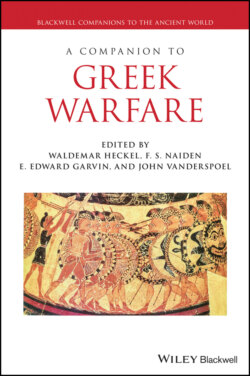Читать книгу A Companion to Greek Warfare - Группа авторов - Страница 24
Sparta’s Wars: Immigration and Conquest of Laconia (c. 950/930)
ОглавлениеThe most important of the migrations, from the north west into the Peloponnese, was labeled by the Greek tradition as the “Return of the Herakleidai,” actually often referred to as the “Doric Migration,” a term no less misleading. The historical process took much time, in several stages. It was fought by groups belonging to the same ethnos but independent of each other. One of them, consisting of several subunits, arrived at the site of the future Sparta not much later than 950.51 Still in the middle of the fifth century the Spartans knew that their ancestors had immigrated from the (intermediate stage of the) Doris region just north of the Thermopylae (Thuc. 1.107.2: Lakedaimonion metropolis, three small towns, among them Erineus). Since 1971, we have had at our disposal a papyrus fragment containing parts of an elegy by the Spartan poet-general Tyrtaeus. Active in the later seventh century, he combines the mythological tradition52 with historical facts: “For he himself, the son of Cronus and spouse of fair-crowned Hera, Zeus, has given this city (Sparta) to the descendants of Heracles. Leaving windy Erineus with them, we arrived in Pelops’ wide island.”53 During the period of migration from Erineus to Sparta the mythological Herakleidai had not been commanders, but two archagetai (“dukes”),54 interpreted as “kings” by later Greeks. Under them, two subgroups had arrived in Laconia and established the originally four neighboring villages of Sparta on virgin ground. Starting from the new settlement, they conquered the Laconian Plain down to the sea. The indigenous population was subdued by force to a state of bondage (the heilotai) or political dependence (the perioikoi), with one substantial exception.
The inhabitants of the small town of Amyclae, situated some 5 km south of Sparta, were integrated as a fifth village.55 This is even more strange since the Amyclaeans were non-Dorian, and their sanctuary (Amyklaion) belonged to Hyakinthos, a god with a pre-Greek name;56 he was later equated with Apollo, as the originally Dorian Ortheia with Artemis, brother and sister. The Amyclaeans had evidently successfully resisted the Spartan expansion and received a privileged position so that their military potential was under control.
